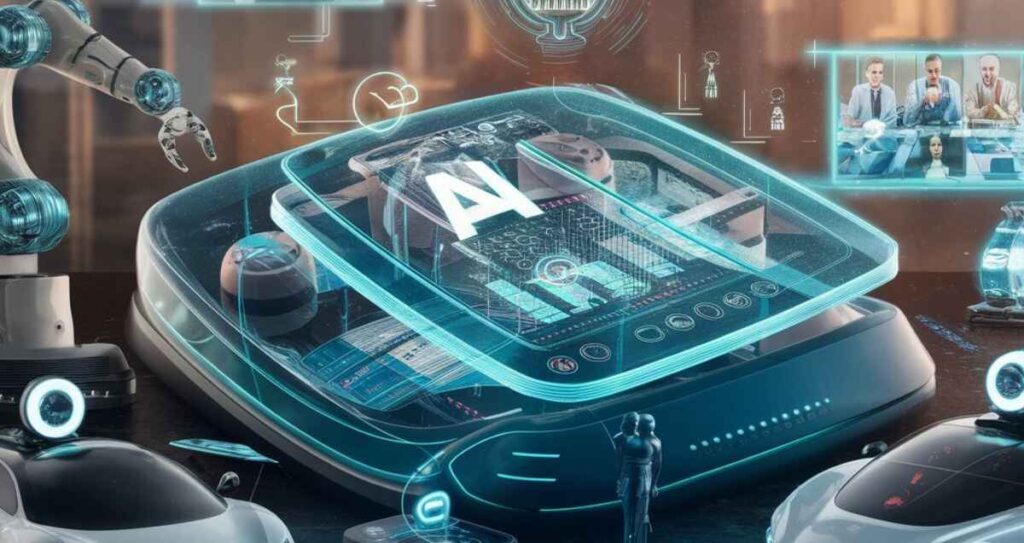AI technology, short for Artificial Intelligence, is the capability of machines to imitate intelligent human behavior, such as learning from experiences, solving problems, and making decisions autonomously.
Imagine a world where machines can learn from experience, solve complex problems, and make decisions independently. This is the essence of Artificial Intelligence (AI), where technology mimics human intelligence to revolutionize industries and everyday life.
Artificial Intelligence (AI) enables machines to mimic human cognitive functions, such as learning and problem-solving, revolutionizing industries with its ability to automate tasks and process vast amounts of data efficiently.
AI Technology

AI technology refers to machines designed to mimic human intelligence. These machines learn from data, make decisions, and solve problems like humans.
Key Concepts of AI
- Machine Learning (ML): ML is a type of AI where machines learn patterns from data without explicit programming. It’s used in predictive analytics and image recognition.
- Natural Language Processing (NLP): NLP helps computers understand and interpret human language. It’s behind chatbots, translation apps, and voice assistants.
- Computer Vision: Computer vision allows machines to interpret visual information from images or videos. It’s critical for tasks like autonomous driving and medical imaging.
Applications Of AI Technology

AI is used in various sectors:
- Healthcare: Improving diagnostics and personalized treatment plans.
- Finance: Enhancing fraud detection and automating trading decisions.
- Retail: Optimizing inventory management and customer service through chatbots.
Read this article: What Is Information Technology?
Benefits Of AI Technology
AI offers several advantages:
- Increased Efficiency: Automates repetitive tasks, boosting productivity.
- Data Analysis: Processes large datasets quickly and accurately.
- Personalization: Delivers tailored experiences to users.
Challenges And Considerations
- Ethical Issues: Privacy concerns, bias in algorithms, and job displacement.
- Regulation: Need for guidelines to govern AI development and deployment.
- Technological Limits: AI lacks human-like creativity and understanding.
Implementing AI In Your Business
Businesses can adopt AI by:
- Assessing Needs: Identifying processes that can benefit from AI.
- Data Preparation: Collecting and preparing high-quality data for AI training.
- Implementation: Partnering with AI experts or investing in internal AI capabilities.
- Monitoring: Continuously evaluating AI systems for performance and accuracy.
Real-World Examples

Also read this article: What Is Technology?
- Healthcare: Predictive Analytics: AI predicts patient outcomes and suggests treatment plans based on medical data, improving healthcare delivery.
- Finance: Algorithmic Trading: AI algorithms analyze market trends and execute trades faster and more accurately than humans, optimizing investment strategies.
FAQ’s
What is AI technology in simple words?
AI technology enables machines to perform tasks that typically require human intelligence, such as learning, reasoning, and problem-solving.
What is AI used today?
AI is used in various applications today, including healthcare (diagnostics, personalized medicine), finance (fraud detection, algorithmic trading), and customer service (chatbots, virtual assistants).
How do I explain AI?
AI can be explained as technology that allows machines to think, learn, and perform tasks intelligently, similar to how humans do.
What is the role of AI technology?
The role of AI technology is to enhance efficiency, automate processes, analyze large amounts of data, and enable new capabilities across industries, transforming how tasks are performed.
Is AI good or bad?
AI itself is neutral; its impact depends on how it’s used. It offers benefits like automation and improved decision making but raises concerns about privacy, job displacement, and ethical implications.
What is AI?
AI examples include virtual assistants (like Siri and Alexa), recommendation systems (Netflix, Amazon), autonomous vehicles, and medical diagnostic tools.
Who created AI?
AI as a field has evolved through contributions from many researchers and institutions since the 1950s. Prominent figures include Alan Turing, John McCarthy, and Marvin Minsky, among others.
Conclusion
AI technology is transforming industries by simulating human intelligence. Understanding its applications, benefits, and challenges is crucial for businesses and individuals embracing this technology-driven future.
In summary, AI represents a powerful tool for innovation, yet its adoption requires careful consideration of ethical, regulatory, and technological factors.
David Mark is a tech and science enthusiast and the writer behind TechNsparks. With a passion for innovation and discovery, David explores the latest advancements in technology and scientific research. His articles provide insightful analysis and engaging commentary, helping readers stay informed about cutting-edge developments. Through TechNsparks, David aims to make complex tech and science topics accessible and exciting for everyone.
